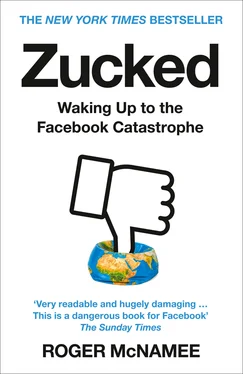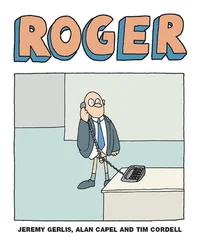Google+ was Google’s fourth foray into social networking. Why did Google try so many times? Why did it keep failing? By 2011, it must have been obvious to Google that Facebook had the key to a new and especially valuable online advertising business. Unlike traditional media or even search, social networking provided signals about each user’s emotional state and triggers. Relative to the monochrome of search, social network advertising offered Technicolor, the equivalent of Oz vs. Kansas in The Wizard of Oz . If you are trying to sell a commodity product like a hammer, search advertising is fine, but for branded products like perfume or cars or clothing, social networking’s data on emotions has huge incremental value. Google wanted a piece of that action. Google+ might have added a new dimension to Google’s advertising business, but Facebook had a prohibitive lead when Google+ came to market, and the product’s flaws prevented it from gaining much traction with people outside of Google. All it offered was interesting features, and Facebook imitated the good parts quickly.
Facebook took no chances with Google+. The company went to battle stations and devoted every resource to stopping Google on the beach of social networking. The company cranked up its development efforts, dramatically increasing the size limits for posts, partnering with Skype, introducing the Messenger texting product, and adding a slew of new tools for creating applications on the platform. As 2012 began, Facebook was poised for a breakout year. The company had a new advertising product—Open Graph—that leveraged its Social Graph, the tool to capture everything it knew from both inside Facebook and around the web. Initially, Facebook gave advertisers access only to data captured inside the platform. Facebook also enabled advertisements in the News Feed for the first time. News Feed ads really leveraged Facebook’s user experience. Ads blended in with posts from friends, which meant more people saw them, but there was also a downside: it was very hard to get an ad to stand out the way it would on radio or TV or in print.
The big news early in 2012 came when Facebook filed for an initial public offering (IPO) and then acquired Instagram for one billion dollars. The Facebook IPO, which took place on May 17, raised sixteen billion dollars, making it the third largest in US history at the time. The total valuation of $104 billion was the highest ever for a newly public company. Facebook had revenues of nearly four billion dollars and net income of one billion dollars in the year prior to the IPO and found itself in the Fortune 500 list of companies from day one.
As impressive as all those numbers are, the IPO itself was something of a train wreck. Trading glitches occurred during the first day, preventing some trades from going through, and the stock struggled to stay above the IPO price. The deal set a record for trading volume on the first day after an IPO: 460 million shares.
The months leading up to the IPO saw weakness in Facebook’s advertising sales that triggered reductions in the company’s revenue forecast. When a company is preparing for an IPO, forecast reductions can be disastrous, as public investors have no incentive to buy into uncertainty. In Facebook’s case, investors’ extreme enthusiasm for the company—based primarily on user growth and Facebook’s increasing impact on society—meant the IPO could survive the reduction in forecast, but Zuck’s dream of a record-setting offering might be at risk. As described by former Facebook advertising targeting manager Antonio García Martínez in his book Chaos Monkeys , “The narratives the company had woven about the new magic of social-media marketing were in deep reruns with advertisers, many of whom were beginning to openly question the fortunes they had spent on Facebook thus far, often with little to show for it.” For all its success with users, Facebook had not yet created an advertising product that provided the targeting necessary to provide appropriate results for advertisers. Martínez went on to say, “A colossal yearlong bet the company had made on a product called Open Graph, and its accompanying monetization spin-off, Sponsored Stories, had been an absolute failure in the market.” Advertisers had paid a lot of money to Facebook, believing the company’s promises about ad results, but did not get the value they felt they deserved. For Facebook, this was a moment of truth. By pushing the IPO valuation to record levels, Facebook set itself up for a rocky start as a public company.
The newly public stock sold off almost immediately and went into free fall after Yahoo Finance reported that the investment banks that had underwritten the IPO had reduced their earnings forecasts just before the offering. In the heat of the deal, had those forecast changes been effectively communicated to buyers of the stock? The situation was sufficiently disturbing that regulatory authorities initiated a review. Lawsuits followed, alleging a range of violations with respect to the trading glitches and the actions of one underwriter. A subsequent set of lawsuits named the underwriters, Zuck and Facebook’s board, and Nasdaq. The Wall Street Journal characterized the IPO as a “fiasco.”
For Facebook’s business, though, the IPO was an undisputed blessing. The company received a staggering amount of free publicity before the deal, essentially all of it good. That turbocharged user growth, news of which enabled Facebook to survive the IPO issues with relatively little damage. Investors trusted that a company with such impressive user growth would eventually figure out monetization. Once again, Facebook pushed the envelope, stumbled, and got away with it. Then they did something really aggressive.
The data from inside Facebook alone did not deliver enough value for advertisers. Thanks to Connect and the ubiquitous Like and Share buttons, Facebook had gathered staggering amounts of data about user behavior from around the web. The company had chosen not to use the off-site data for commercial purposes, a self-imposed rule that it decided to discard when the business slowed down. No one knew yet how valuable the external data would be, but they decided to find out. As Martínez describes it, Zuck and Sheryl began cautiously, fearful of alienating users.
Thanks to the IPO, Facebook enjoyed a tsunami of user growth. Within a few months, user growth restored investor confidence. It also overwhelmed the complaints from advertisers, who had to go where their customers were, even if the ad vehicles on Facebook were disappointing. The pressure to integrate user data from activities away from Facebook into the ad products lessened a bit, but the fundamental issues with targeting and the value of ads remained. As a result, the decision to integrate user data from outside Facebook would not be reversed.
In early October 2012, the company announced it had surpassed one billion monthly users, with 600 million mobile users, 219 billion photo uploads, and 140 billion friend connections. Despite the mess of the IPO—and not being privy to the issues with ads—I took great pride in Facebook’s success. The stock turned out to be a game changer for Elevation. Even though my partners had turned down our first opportunity to invest, Elevation subsequently made a large investment at a relatively low price, ensuring on its own that the fund would be a winner.
Only eight and a half years from Zuck’s dorm room, Facebook had become a powerful economic engine. Thanks to the philosophy of “move fast and break things,” no one at Facebook was satisfied with a record-setting IPO. They began hacking away at the problem of monetizing users. There were several challenges. As Martínez wrote in Chaos Monkeys , the advertising team around the time of the IPO was, for the most part, young people who had no previous work experience in advertising or even media. They learned everything by trial and error. For every innovation, there were many mistakes, some of which would have been obvious to a more experienced team. The team may have been young, but they were smart, highly motivated, and persistent. Their leadership, with Sheryl Sandberg at the top, created a successful sales culture. They took a long view and learned from every mistake. They focused on metrics.
Читать дальше






